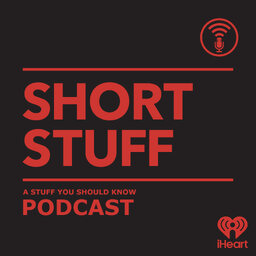Short Stuff: Roly Poly...Bugs?
Roly Poly bugs go by many names. They look like tiny armadillos. They're great for your garden. And they're crustaceans. Yeah, you read that right.
In 1 playlist(s)
Stuff You Should Know
If you've ever wanted to know about champagne, satanism, the Stonewall Uprising, chaos theory, LSD, …Social links
Follow podcast
Recent clips

Short Stuff: Color Psychology
12:06

Helen Keller and Anne Sullivan: Miracle is Right
43:33

Selects: Operation Mincemeat: How A Corpse Fooled the Nazis
45:18
 Stuff You Should Know
Stuff You Should Know